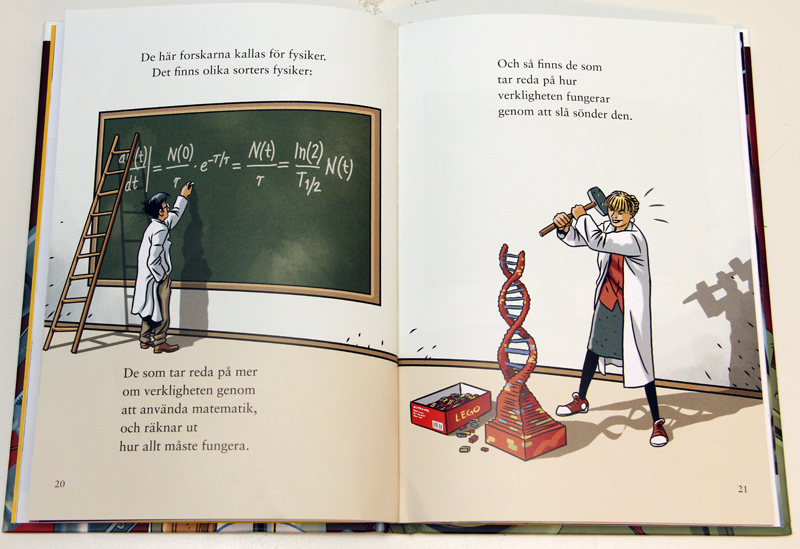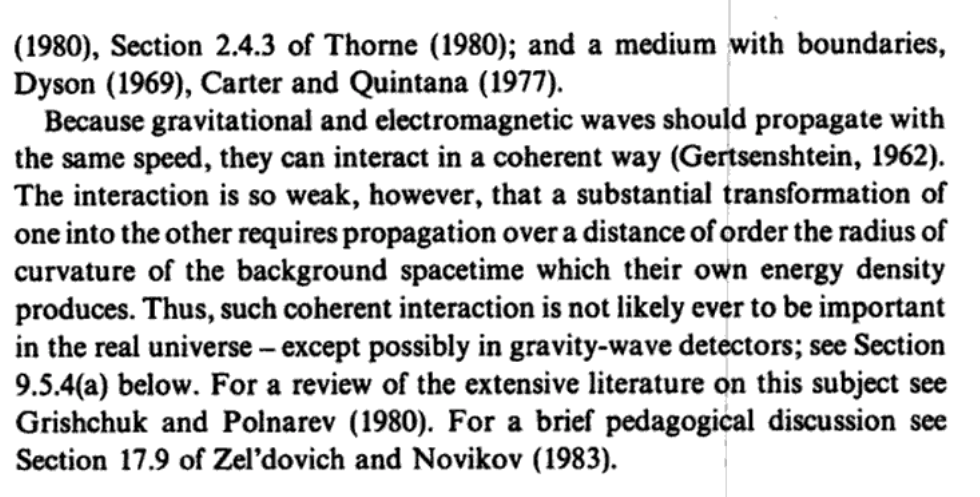-
Posts
2578 -
Joined
-
Days Won
21
Content Type
Profiles
Forums
Events
Everything posted by Ghideon
-
What have you tried so far? If it is the definition you struggle with this may help: profit percentage is calculated with cost price taken as base https://en.m.wikipedia.org/wiki/Profit_margin
-

Can gravitational waves be affected by matter?
Ghideon replied to Ghideon's topic in Astronomy and Cosmology
Quite an engineering challenge to construct, launch and to operate it! (With zero maintenance possibilities once launched, probably better discussed in a separate thread) I have a followup question regarding lensing. How does a black hole affect gravity waves? Initially I thought the waves would pass through* since gravity cannot be shielded. Even close to a black hole an observer must be affected by changes in gravitation due to some gravitational event behind the black hole from the observers point of view. But since the waves follow the curvature inside the black hole as light would do, and nothing entering a black hole may get out again, there should be no gravity waves passing through a black hole. So how are the changes in gravity "communicated" to the other side of a black hole? I believe the solution is the lensing effect. If gravity waves bends as photons then there would be some parts of the waves that follows a path from behind a black hole to an observer on the front side. Can someone confirm or explain? My reasoning is that gravitational waves behaves similar to: http://hubblesite.org/explore_astronomy/black_holes/encyc_mod3_q11.html Probably GR would predict what happens but that math is far beyond my level, at least now. Here is a thought experiment I tried**, it also shows gravitational waves should not pass through a black hole: If gravitational waves could pass through a black hole and since there is a small but non-zero absorption by matter then it could in principle be possible to get information about matter distribution in a black hole. For instance it could be possible to tell if matter is more evenly distributed, or contained in a small dense region in the centre. But as far as I know it should not be possible, not even in principle, to get that information, or any other information***, from the inside of a black hole. It does not matter whether it is possible to engineer such a measurement or of we believe matter is in the centre or not. What matters is that any experiment that would reveal properties of what's inside the event horizon is wrong according to mainstream science. Conclusion: The thought experiment tells me that no, gravitational waves are not allowed to enter, and then exit, a black hole. *) A part of a wave crosses the event horizon and later emerges again at some other point. **) I haven’t yet found this one online so I'm not sure it is correctly performed. Corrections & improvements are welcome! ***) except for properties mass, angular momentum and electrical charge, accessible from outside the event horizon. -
Hello. What have you tried so far? Is this math or physics or other? Are you supposed to do a calculation or suggest an experiment? Can you show the homework task?
-
Personal opinion: The difference in discussion tone here in this thread, compared to what is much more common among the same set of members in other topics in our forum, serves as a little illustration how complex the discussed matters probably are to address and solve on a national and European level.
-

why/how a particle can go into superposition
Ghideon replied to hipster doofus's topic in Speculations
It does not need to be a new theory, did someone claim that? But the following suggested that some major answers (and hence progress of existing theories) was intended: -

why/how a particle can go into superposition
Ghideon replied to hipster doofus's topic in Speculations
Quantum physics is a complicated topic. It contains concepts and properties that might look counter intuitive from our daily macroscopic perspective. It means that analogies and pop-sci comparisons are of limited use to explain and predict behaviour at quantum level. Progress is made by understanding an applying mathematic tools and concepts (inside and outside of the box) and by performing rather complicated experiments. Reaching such a level of mathematic knowledge at age 15 is definitely not impossible but probably very unlikely. That, in combination with rather vague posts without math in this thread, makes it unlikely that the ideas stated will lead to profound levels of progress at this point. But since genuine interest in fundamental physics have been displayed it might be good to pause the posting of new ideas and take some time posting questions in the mainframe sections? -

why/how a particle can go into superposition
Ghideon replied to hipster doofus's topic in Speculations
I believe there are plenty of members here quite capable of such thinking once a box is defined. But why not try some thinking inside the preconfigured box first; maybe some way of communicating the idea may emerge? -

why/how a particle can go into superposition
Ghideon replied to hipster doofus's topic in Speculations
Ok: No, your statements doesn't posses the properties needed. No, the fuzziness here implies something is missing from your posts. If your discussion doesn't gain momentum and becomes clear the discussion will be short. How about posting enough details and definitions so that some kind of scientific discussion about your idea is possible? -
Good point! It was some decades ago but I still remember how cool it was to build stuff. I think the ball-n-stick model could be fun to combine with a (free) online tool such as Molview. I'll use Sensei's picture as an example. If kid asks "what have I built? What does it do?". Personally I couldn't identify the compound in the picture but a few minutes in Moleview tells us that it (likely) is "Proline, an alpha-amino acid" and "Amino acids help break down food, support growth, and repair body tissue." http://molview.org/?cid=614 There are of course other methods. Personally I don't know much chemistry so this is a quick method to be able to tell some basic facts.
-
Cool! For atoms and particles (and science in general) I have used books with lots of pictures so that we can both read together and/or kids can explore the book and ask questions later. Here is an example, the author explains that there are two types of scientists within the physics, the physicists who calculate mathematically how things work and the physicists who break things down so that the counting physicists can figure out why. The book* is excellent but I've not been able to find a translated version. I post it as an example even if it is not in english. Introduction to standard model; how many types of Quarks are required? Your kid is probably already past this stage already but others might find it useful. I've used Toca Lab which focuses on playing around with the elements and the periodic system. pros: All 118 elements can be "discovered" in a periodic table focused layout. Some basic behaviour included; gases "hover", solids drops down on the table. Opens for discussion based on periodic system and elements. AFAIK no commercials Cons: Focus is on playing, not scientifically correct details. Example: new elements can be "created" from other elements. Kids won't learn detailed scientific information without interaction with an adult or older kids. Here is a review: https://www.commonsense.org/education/app/toca-lab-elements Here is a PDF with all elements already "discovered": https://s6.pappasappar.se/wp-content/uploads/TocaLab_PeriodicTable.pdf. The app starts with an empty one. *) https://www.bonniercarlsen.se/bocker/163790/om-pyttesma-partiklar/
-

What could win a Nobel Prize in the Star Wars galaxy?
Ghideon replied to Maximum7's topic in The Lounge
Some ideas, I do not know the complete of all partes of the various stories so these may already exist in the universe: Regenerating lost limbs or both parts. Advanced version of above; modifications allowing bodies to automatically and quickly regenerate. "Nanotech" versions of standard equipment in the universe; implants allowing an individual to use tractor beam or hyperdrive* technologies without help of any external tools. The opposite, larger versions; Planet hyperdrive; move moons or planets to other star systems or hide them in interstellar space. Turing elements into other elements in large amounts, for instance making titanium from hydrogen. *) Note, that could be classified as teleportation and maybe disqualified. -

Can gravitational waves be affected by matter?
Ghideon replied to Ghideon's topic in Astronomy and Cosmology
Continuing my post from yesterday with other effects than lensing. I believe I've learnt some more now. A chapter in Three Hundred Years of Gravitation* provides a catalog of wave propagation effects which I think answers my question regarding the small negligible effects. Gravitational waves can for instance be absorbed, scattered and dispersed. The effects are negligible except near the Planck era. The book contains several interesting references to detailed analysis of different kinds of matter but I’ve not yet looked at those. A page from the book: I think the effects mentioned above raises a new question when combined with: If the effects listed above are negligible except near the Planck era, is that a problem or a feature (or both)? Would the non negligible effects hinder scientific observations of any remaining early gravitational waves? Or would the effects be a factor that helps to expose interesting properties of an early epoch? *) K. S. Thorne, “Gravitational radiation.” in Three Hundred Years of Gravitation, edited by S. W. Hawking and W. Israel (1987) -

Can gravitational waves be affected by matter?
Ghideon replied to Ghideon's topic in Astronomy and Cosmology
Good point. I see that my question could be better stated. I made an implicit distinction: Affected by gravity = a gravitational wave disturbed when passing through a gravitational field in vacuum Affected by matter = a gravitational wave disturbed when passing through matter, like straight through the earth I see that these two of course are overlapping. -

Can gravitational waves be affected by matter?
Ghideon replied to Ghideon's topic in Astronomy and Cosmology
Your responses above helped me to formulate relevant searches. I found some interesting material and I’ll post some followups, starting with lensing. It seems to be generally accepted that gravitational waves are lensed and the effect is not negligible. Here is a paper discussing how to use that fact to probe fundamental physics: https://arxiv.org/pdf/1612.02004.pdf According to the paper gravitational waves are subject to gravitational lensing in almost exactly the same manner as photons. Here is a speculative* paper claiming lensing have already allowed for dual observations of one event: https://arxiv.org/abs/1901.03190 My conclusion: gravitational lensing of gravitational waves may be a useful tool. (Even if the results in the paper above is not confirmed.) *) Note that LIGO representatives does not agree: https://www.scientificamerican.com/article/has-ligo-seen-galaxy-warped-gravitational-waves/ -
I believe curious philosophical questions and discussions in a relevant part of the forum is a good thing. I also believe stubborn soap boxing in mainstream section is not so good.
-
Here is my attempt: The universe is all existing matter and space considered as a whole. In mainstream science there are models and theories, supported by observations, describing various aspects of the universe. One example is big bang, describing the universe’s evolution from an early dense hot state.
-

Can gravitational waves be affected by matter?
Ghideon replied to Ghideon's topic in Astronomy and Cosmology
I think I agree on that, and I would like to understand more about how that works. When trying to formulate some analogy my attempts sounds too vague and opens for possibilities that the gravitational wave could be unaffected. Like: I could measure the distance of one meter without affecting "the meter", space time coordinates are unaffected by my activities*. Or: I could measure and calculate time dilation without affecting the passing of time? Your comment is spot on regarding my question; are there (tiny) effects on gravitational waves passing trough matter, effects that are not there when the wave passes through vacuum. Could be, I'll have to read some more before commenting. Excellent! I was too focused on the individual setup of each site, missing that completely. *) I kind of see gravitational wave as a geometrical effect. The gravitational wave does not do work, squeezing the particles. Kind of like universe expansion does not move galaxies, it is just the distance that gets bigger. I'm not convinced my view is a correct description. -

Can gravitational waves be affected by matter?
Ghideon replied to Ghideon's topic in Astronomy and Cosmology
From the source https://stuver.blogspot.com/p/informational-posts.html, bold by me: I'm curious, what are these negligible effects? Without knowing what explosions you might have in mind I'll answer regarding earth vibrations in general. As @Strange said, a lot of effort goes into making sure vibrations are not detected. LIGO uses two basic strategies to shield the detectors from Earthly vibrations, referred to as “Passive” and “Active” vibration isolation systems. Source and more info: https://www.ligo.caltech.edu/page/faq -

Can gravitational waves be affected by matter?
Ghideon replied to Ghideon's topic in Astronomy and Cosmology
Thanks! Good and quick answer! From your source: "Universe is essentially transparent to a gravitational wave." I'll study the rest to see what "essentially transparent" means in this context. -
How are gravitational waves affected by gravitational fields and matter through which the waves pass? What interactions are predicted by mainstream theories? I’m interested in discussing such predictions even if observations or experiments are not (yet) possible. I have some (limited) understanding of how space and matter are affected by a passing gravity wave*. But not the other way around, how matter (and gravity) can affect a gravity wave. *) LIGO
-
Cellular automata, pixel, cell, tile or virtual machine? Why do you create the same kind of threads over and over again? What is the purpose? https://www.scienceforums.net/topic/117548-theory-of-everything-of-final-theory/: https://www.scienceforums.net/topic/116102-thought-experiments/?tab=comments#comment-1070890:
-
How about discussing your idea instead? The above is covered in the thread you started here https://www.scienceforums.net/topic/108468-where-are-the-laws-of-the-universe-exactly
-
It sounds like a variant of "The universe could have been created 15 minutes ago and made to look billions of years old."* What kind of experiment can we make to tell the difference? *) borrowed from @Strange
-
My assumption is that if one would perform a rigorous analysis (math, experiments models) of the idea one would end up with something that exactly is the current mainstream theories*. One would have to create "fine tuned" definitions that makes the idea indistinguishable from the current mainstream. Or end up with something that does not match observations and therefore be considered incorrect. The shift in perspective would add no new explanations, predictions, tests or have scientifically interesting consequences. That said, "space is moving things around" might open up discussions from a more philosophical point of view, but that would be a separate thread in another section of the forum. *) With the exception of course for new discoveries extending the current models and theories
-

Mental Momentum (short essays about mind and brain)
Ghideon replied to Mental Dynamist's topic in Speculations
(bold by me) What is the relevance of that specific individual in this context?





